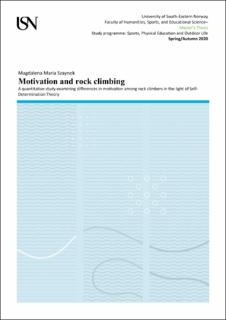Motivation and rock climbing. A quantitative study examining differences in motivation among rock climbers in the light of Self-Determination Theory
Master thesis
Published version
Permanent lenke
https://hdl.handle.net/11250/2721100Utgivelsesdato
2020Metadata
Vis full innførselSamlinger
Sammendrag
This thesis was designed to investigate, in the light of Self-Determination Theory (Deci & Ryan, 2004), the differences in motivation between different climbing subgroups. Climbers were categorized by the preferred type of climbing (rope climbing or bouldering) and preferred climbing environment (outdoor or indoor). Three hundred and sixty-six questionnaires, with BREQ-3 questionnaire (Wilson et al., 2006) as a base, were collected among climbers in Norway.
The results demonstrated that environmental preference is a factor that influences the motivation of a climber. Outdoor subgroup was generally more intrinsically motivated, than the indoor subgroup, together with a higher level of self-regulated forms of the extrinsic motivation. The comparison of motivation between rope climbers and boulderers didn’t show any significant difference. The findings supports also the conclusion that frequency of climbing activity is influenced by type of climbing, environment, intrinsic motivation, integrated regulation, identified regulation, years of climbing experience and membership in a climbing group.
The findings provide a guideline for understanding the motivation in the climbing world and can be applicable in designing new climbing venues and climbing events.
